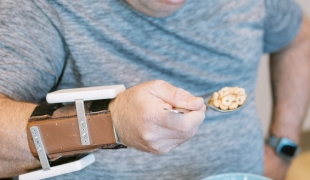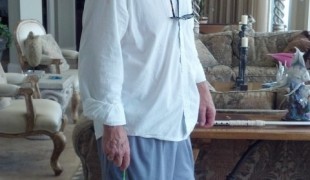- 7161
- 477
- 8
- 12
- 0
- Help Ukraine
About the solution
Uma was diagnosed with epilepsy at the age of 11. Since then, she has been admitted four times to the hospital due to seizures. Some of her epileptic attacks occurred in places where no one knew how to help her.
That inspired her to invent Cocoon, a device that protects the head from injuries during a seizure. It is portable and includes first-aid instructions for bystanders.
The device is mainly aimed at patients who have an aura, visual symptoms caused by a focal seizure, right before the tonic-clonic seizure, which involves the whole brain and at which point the patient loses consciousness.
So, when the user experiences an aura, they can use the Cocoon to protect themselves before the full-blow epileptic attack occurs. The device is very fast to unfold and opened up. Then the user simply has to rest their head under the mesh. It keeps the user’s head stable on an anti-suffocation pillow.
Uma calls the invention an ‘epileptic safe space’.
Inside, it has a sensor which detects the start of the convulsion. If after three minutes the seizure persists, it automatically calls an ambulance using IoT technology. It also has a GPS which informs family members about the coordinates of the patient.
Thanks to her invention, Uma has earned the James Dyson Award. The prototype now needs to pass medical testing and approval by the FDA before it can reach the market.
Adapted from: http://bit.ly/2NEVdCX
http://bit.ly/2PNzDPo
More info: https://www.umasmith.com
https://www.youtube.com/watch?v=xT5YrIXEWsE&feature=youtu.be
https://www.youtube.com/watch?v=YizZuUCDnS0
This solution shall not include mention to the use of drugs, chemicals or biologicals (including food); invasive devices; offensive, commercial or inherently dangerous content. This solution was not medically validated. Proceed with caution! If you have any doubts, please consult with a health professional.
DISCLAIMER: This story was written by someone who is not the author of the solution, therefore please be advised that, although it was written with the utmost respect for the innovation and the innovator, there can be some incorrect statements. If you find any errors please contact the patient Innovation team via info@patient-innovation.com
-
-
380
-
0
-
4615

Collaborator Pierluigi Mantovani creates Evolution Devices - solutions that aim to transform Multiple Sclerosis Management
CAREGIVING
BODY BALANCE: Maintaining body balance
STANDING UP: Standing up from a seated position
WALKING: Walking
Multiple Sclerosis
Assistive Daily Life Device (to help ADL)
Walking Aid (wheelchair/walker/crutches)
App (Including when connected with wearable)
AI algorithm
Body-Worn solutions (Clothing, accessories, shoes, sensors...)
Restoring mobility
Regaining sensory function
Managing pain
Promoting self-management
Preserving Organ Function
Managing Neurological Disorders
Maintaining Balance and Mobility
To improve Treatment/Therapy
Preventing (Vaccination, Protection, Falls, Research/Mapping)
Raise awareness
Caregiving Support
General and Family Medicine
Internal Medicine
Medical Genetics
Neurology
Physical Medicine and Rehabilitation
United States
-
-
-
645
-
0
-
11317

Man invents tremor-suppression technology to help people with Parkinson’s disease
Writing (letters, songs, peoms)
(SELF)-CARE: EATING: Eating independently.
(SELF)-CARE: DRINKING: Drinking independently.
BODY BALANCE: Maintaining body balance
Parkinson's Disease
Treatment/Surgical device
Body-Worn solutions (Clothing, accessories, shoes, sensors...)
Gait abnormalities (e.g., walking difficulties, unsteady gait)
Tremors
Muscle cramps or spasms
Difficulty coordinating movements
Stiffness or rigidity (difficulty moving)
Muscle weakness
Trouble with fine motor skills (e.g., writing, buttoning clothes)
Cognitive impairment
Headaches
Restoring mobility
Managing Neurological Disorders
To improve Treatment/Therapy
Preventing (Vaccination, Protection, Falls, Research/Mapping)
Neurology
Viet Nam
-
-
-
745
-
0
-
10818

Assistive walking device
WALKING: Walking
WALKING WITH A WALKING AID: Walking with a walking aid
BODY BALANCE: Maintaining body balance
Body-Worn solutions (Clothing, accessories, shoes, sensors...)
App (Including when connected with wearable)
Assistive Daily Life Device (to help ADL)
Walking Aid (wheelchair/walker/crutches)
Loss of balance
Frequent falls
Restoring mobility
Regaining sensory function
Managing Neurological Disorders
Recovering from Traumatic Injuries
Maintaining Balance and Mobility
Preventing (Vaccination, Protection, Falls, Research/Mapping)
Neurology
Physical Medicine and Rehabilitation
Mobility issues
Solutions for Disabled people
United States
-
 en
en